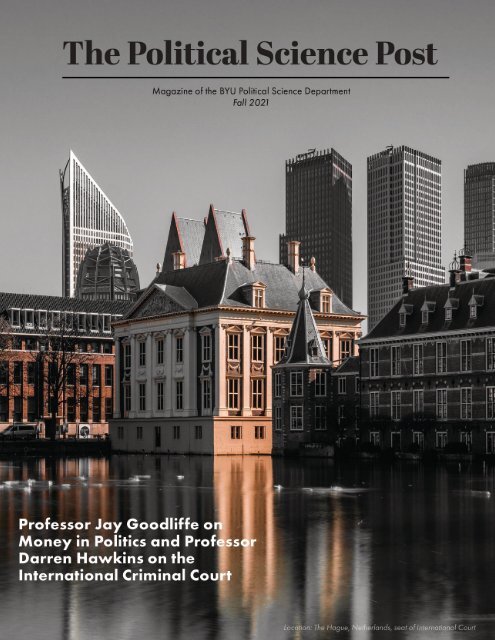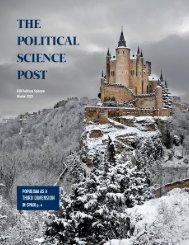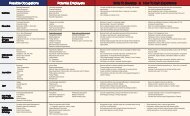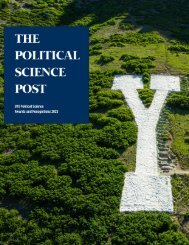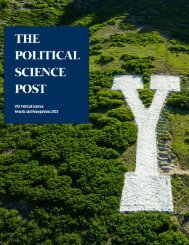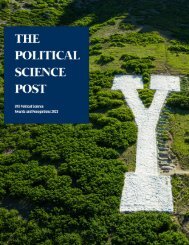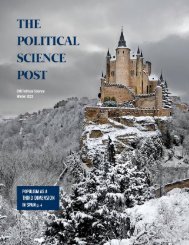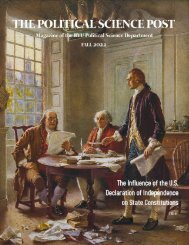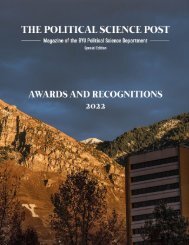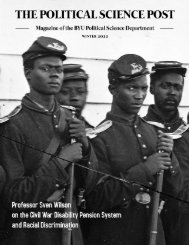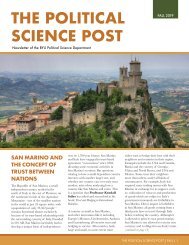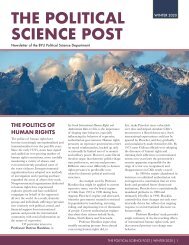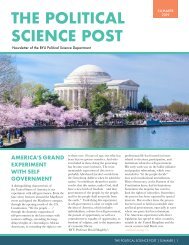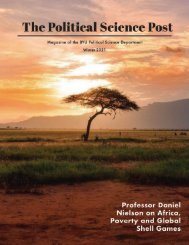Create successful ePaper yourself
Turn your PDF publications into a flip-book with our unique Google optimized e-Paper software.
1
CONTENTS<br />
FALL <strong>2021</strong><br />
THE SYAHIM MAG<br />
FOREWORD 2<br />
INTERNATIONAL CRMINAL COURT AND<br />
MONEY IN POLITICS 3<br />
The BYU Department<br />
of Political Science,<br />
consistent with the aims<br />
of a BYU education,<br />
intends to foster “Lifelong<br />
Learning and Service.”<br />
We hope to provide<br />
our alumni with<br />
intelligent, thoughtful<br />
and sophisticated<br />
analysis of important<br />
issues, and to act as<br />
a catalyst for service<br />
in our communities,<br />
neighborhoods, nations<br />
and the world.<br />
EVENTS AND PROGRAMS 5<br />
POLITICAL PHILOSOPHER 10<br />
ALUMNI SPOTLIGHTS 11<br />
STUDENT SPOTLIGHTS 13<br />
FACULTY SPOTLIGHTS 14<br />
FACULTY PUBLICATIONS<br />
`17<br />
FACULTY IN THE NEWS 19<br />
FACULTY QUOTES 23<br />
Publisher:<br />
Jay Goodliffe, Chair<br />
Editor:<br />
J. Matthew Clarke<br />
1<br />
2<br />
Graphic Designer:<br />
Sydney Freeman
THE BUZZ IN THE AIR<br />
August 26th, <strong>2021</strong><br />
Today is my favorite day on the BYU campus. It is the<br />
first day of new student orientation. I love the buzz in the<br />
air, and I love to see these kids bursting with excitement<br />
(and nervousness) about what lies ahead.<br />
Most of these students are very faithful Latter-Day Saints.<br />
But some of them come to us with serious concerns<br />
about their faith and their status in the church. They<br />
have deep questions that are hard to answer. Some are<br />
already rapidly proceeding towards the exits. As BYU<br />
faculty, we do everything we can to build their faith. We<br />
give them reasons to stay.<br />
FOREWORD<br />
FALL <strong>2021</strong><br />
Most of these students are mentally and emotionally<br />
strong, but a rapidly growing proportion come to us<br />
with depression and anxiety. As BYU faculty, we try to<br />
help strengthen them and steer them towards resources<br />
that can help.<br />
Most of these students come here loaded with privilege.<br />
They are very kind, good-hearted kids, but they don’t<br />
always see how that privilege has shaped their world. As<br />
BYU faculty, we try to help them see so that they can<br />
love their brothers and sisters with more empathy.<br />
Most of these students come to us brimming with<br />
confidence, but they will all face challenges. They<br />
discover quickly that BYU is an intellectually challenging<br />
place. They learn quickly that adulthood is laced with a<br />
variety of challenges they hadn’t anticipated. And some<br />
come to us with a history of abuse, neglect, disability, or<br />
economic hardship that has stolen their confidence. As<br />
BYU faculty, we teach all of our students that they are<br />
children of God with an unlimited, divine potential.<br />
Most of these students fit in quite easily socially, but too<br />
many feel they don’t belong. This may be due to their<br />
race or ethnicity, their economic background, their<br />
sexual orientation or identity, their family history, or<br />
any number of reasons. As BYU faculty, we welcome<br />
each of them. We let them know—regardless of where<br />
they come from—that they belong; they belong with us.<br />
So, to all you parents out there who have or hope to<br />
have your children join us at BYU, know that we, as BYU<br />
faculty, have your back. We will love your children as<br />
we love our own. We are not perfect, but they are safe<br />
with us.<br />
SVEN WILSON<br />
Outgoing Chair of the Department of Policitcal Science<br />
3<br />
2
THE SYAHIM MAG<br />
Professors Jay Goodliffe and Darren Hawkins on the<br />
International Criminal Court<br />
3<br />
At the end of World War II, some idealistic states<br />
and non-state actors pushed for the creation of a<br />
permanent international court of human rights that<br />
would build on the success at Nuremberg, Germany<br />
where a series of military tribunals were held after WW<br />
II prosecuting prominent members of Nazi Germany<br />
for crimes against humanity. Yet most states, concerned<br />
about their sovereignty, strongly resisted such a court,<br />
even for the most heinous crimes. Over the next 40<br />
years, proponents kept proposals for a court alive in<br />
obscure United Nations (UN) study commissions but<br />
never made substantial progress.<br />
This is how Professors Jay Goodliffe’s and Darren<br />
Hawkins’ article entitled “A Funny Thing Happened on<br />
the Way to Rome: Explaining International Criminal Court<br />
Negotiations” (Journal of Politics, 71, 977-997), begins.<br />
At the end of the Cold War and in the face of brewing<br />
human rights troubles in Yugoslavia and Somalia,<br />
a few states decided to make a renewed push for an<br />
international court. The UN General Assembly (GA)<br />
delegated the task of creating a draft statute to the<br />
International Law Commission (ILC), an expert body<br />
of legal scholars that had studied the issue on and<br />
off during the previous decades. The Commission,<br />
well-experienced with state reluctance to actually do<br />
anything to protect human rights, produced an August<br />
1994 draft statute that envisioned a relatively weak<br />
International Criminal Court (ICC) that would serve as<br />
an agent of the Security Council.<br />
4<br />
Virtually everyone expected that only a relatively<br />
toothless Court that served the interests of powerful<br />
states could gain approval.<br />
The ICC, however, became the first and only<br />
permanent international court with jurisdiction to<br />
prosecute individuals for the international crimes of<br />
genocide, crimes against humanity, war crimes and the<br />
crime of aggression. It was intended to complement<br />
existing national judicial systems, and it may, therefore,<br />
exercise its jurisdiction only when national courts are<br />
unwilling or unable to prosecute criminals. The ICC<br />
lacks universal territorial jurisdiction, however, and<br />
may only investigate and prosecute crimes committed<br />
within member states, crimes committed by nationals<br />
of member states, or crimes in situations referred to<br />
the Court by the United Nations Security Council.<br />
Some key characteristics of the ICC include: trials are<br />
fair, the prosecution is independent, defendant’s rights<br />
are upheld, victims’ voices are heard, participating<br />
victims and witnesses are protected, and the court<br />
engages in a two-way dialogue with communities that<br />
have suffered from crimes under its jurisdiction. The<br />
ICC has over 900 staff members, from 100 states, with<br />
six official languages: English, French, Arabic, Chinese,<br />
Russian and Spanish. So far, 30 cases have come before<br />
the Court, and ICC judges have issued 35 arrest<br />
warrants. The judges have issued 10 convictions and 4
acquittals, so far, since 2002, nearly 20 years since its<br />
inception.<br />
One key case at present is that of Ali Muhammad Ali<br />
Abd-Al-Rahman, who was transferred to the ICC's<br />
custody on 9 June 2020, after surrendering himself<br />
voluntarily in the Central African Republic. The initial<br />
appearance of Mr Abd-Al-Rahman before the ICC took<br />
place on 15 June 2020. According to the Prosecution's<br />
submission of the Document Containing the Charges,<br />
Mr Abd-Al-Rahman is suspected of 31 counts of<br />
war crimes and crimes against humanity allegedly<br />
committed between August 2003 and at least April<br />
2004 in Darfur, Sudan. The confirmation of charges<br />
hearing took place on 24 -27 May <strong>2021</strong>.<br />
The next steps for Mr. Abd-Al-Rahman’s trial, include:<br />
After hearing the oral submissions of the Prosecutor,<br />
the Legal Representatives of the Victims and the<br />
Defense from 24 to 26 May, <strong>2021</strong>, the judges have<br />
entered their deliberations. The Pre-Trial Chamber<br />
shall deliver its written decision within 60 days of the<br />
date on which the confirmation hearing ends. This is a<br />
good example of how the court works.<br />
question: why did states create an institution to<br />
enforce international norms in such robust ways, even<br />
facilitating possible strong ICC action against highlevel<br />
government officials? Such behavior is puzzling<br />
because states that jealously guard their sovereignty<br />
have traditionally been reluctant to support<br />
international institutions with the ability to enforce<br />
international norms.<br />
The article argues that governments support (or fail to<br />
support) international institutions because they care<br />
deeply about potential reactions of the international<br />
partners on whom they depend for a diverse set of<br />
goods that range from trade to security to votes and<br />
support in international organizations. They labeled<br />
this set of partners as a “dependence network” and<br />
argue that leaders watch closely how<br />
(continued on page 24)<br />
To understand how the idea of the ICC evolved from<br />
a “toothless” Court, to one with substantial power,<br />
this article by Goodliffe and Hawkins analyzes the four<br />
formation years, from 1994 to 1998, when a “funny<br />
thing happened on the way to the Rome Statute”,<br />
before the ICC foundational documents were adopted<br />
in July 1998. States unexpectedly strengthened the<br />
ILC’s proposal for a weak Court in several ways: In the<br />
end, states endowed the Court with an independent<br />
prosecutor able to initiate cases, prevented the Court<br />
from falling under exclusive Security Council control,<br />
granted the Court automatic jurisdiction upon state<br />
ratification of the statute, and granted relatively<br />
permissive conditions under which the Court could<br />
exercise its jurisdiction. None of these provisions<br />
existed in the ILC’s original draft.<br />
The ICC was formally founded on July 1, 2002 in<br />
Rome, Italy, but has since found its seat in the Hague,<br />
Netherlands as an intergovernmental organization and<br />
international tribunal.<br />
The reach and teeth of the ICC provoke a compelling<br />
5<br />
4
PROFESSOR KELLY<br />
PATTERSON'S <strong>2021</strong><br />
HICKMAN LECTURE<br />
EVENTS AND<br />
PROGRAMS<br />
Today I would like to present something<br />
that Professor Karpowitz and I have been<br />
working on for years and is part of a<br />
larger book project on individualism. We<br />
have spent countless hours refining the<br />
measures. We have conducted multiple<br />
surveys, and we have presented the<br />
research in multiple academic venues. We<br />
want to present something today to honor<br />
Dean Hickman that is fresh and timely.<br />
anymore to Americans?<br />
Michael Sandel, in Justice: What’s the Right Thing to Do?, wrote<br />
that “The hollowing out of the public realm makes it difficult<br />
to cultivate the sense of solidarity and sense of community on<br />
which democratic citizenship depends.” (p. 267).<br />
The pandemic has made us particularly aware of whether or<br />
not America retains a vocabulary capable of helping us navigate<br />
through the demands of individualism and a public good.<br />
These are just a smattering of headlines that call attention to<br />
the dilemma, and the ways in which public life in America seems<br />
to be a war of all against all.<br />
Individualism as a word has increased in usage over the history of<br />
the republic. Individualism and the public good have increased,<br />
but they are not equal in usage. See chart below.<br />
5<br />
6<br />
The “Big” Question that we want to<br />
talk about today is the tension between<br />
individualism and regard for the community.<br />
This “question” has animated theorists and<br />
social scientists for centuries now, and it<br />
was certainly one of the major tensions at<br />
the heart of the American founding. James<br />
Madison wrote and defined “Factions” as “A<br />
number of citizens, whether amounting to<br />
a minority or majority of the whole, who<br />
are united and actuated by some common<br />
impulse of passion or interest, adverse<br />
to the rights of other citizens or to the<br />
permanent and aggregate interests of the<br />
community.”<br />
Alexis de Tocqueville made many<br />
observations about America and early<br />
on noted the character and qualities of<br />
American political life: Individualism is “a<br />
calm and considered feeling which disposes<br />
each citizen to isolate himself from the<br />
mass of his fellows and withdraw into the<br />
circle of family and friends;” “with this little<br />
society formed to his taste, he gladly leaves<br />
the greater society to look after itself”<br />
(Tocqueville 1969, 506, emphasis added<br />
)<br />
If Americans tend toward individualism,<br />
would it be possible to preserve a vocabulary<br />
of democratic citizenship? How does this<br />
individualism affect the way in which we<br />
interact in the public arena? Does the<br />
idea of a public arena even mean anything<br />
Certain phrases capture the essential qualities of individualism.<br />
Many, if not all of these phrases, have increased in usage over<br />
time. In this slide, the N-Gram analysis predicts the fifth word.<br />
So, whenever people say, “I do what I . . . ,” the N-gram analysis<br />
fills in the word that is most likely to follow: “I do what I . . . can,<br />
want, have, like, will, am, do, etc.” These are “Phrases associated<br />
with Individualism”.<br />
N-Gram analysis of “Do what you _______”: want, can,<br />
have, do, like, say, think, are, will, you please. Again, these are<br />
phrases associated with Individualism. Concepts associated with<br />
Individualism: N-Gram analysis of “no right or wrong_______”:<br />
answers, way, in, home, ways, to, about, responses, side.
What we want to examine today is the extent<br />
to which we might find a particular form of<br />
individualism to be at odds with some of the<br />
activities that are often associated with a<br />
regard for the public.<br />
Thinking about the meaning of individualism<br />
is at the core of this project: the relationship<br />
of self and authority. Individualism involves<br />
the individual as the primary or perhaps<br />
even sole source of all authority on matters<br />
of importance to that individual. And on<br />
that view, the individual has the capacity<br />
to determine the course of her life and the<br />
values that will define that life without outside<br />
interference. The term “individualism” is<br />
often attributed to “self-authorization.”<br />
Individualism is a value, but in political<br />
science it has been measured with a distinctly<br />
economic frame. Political scientists have<br />
identified a variety of “political values”.<br />
Among those are support for equality, liberty,<br />
welfare, and individualism. However, the<br />
operationalization of individualism has a<br />
distinctly economic frame. When discussing<br />
individualism, political theorists and social<br />
psychologists use the term in more than just<br />
an economic framework, however. Within the<br />
economic frame are prevalent ideas, such as:<br />
any person who is willing to work hard has a<br />
good chance at succeeding; but also, hard work<br />
offers little guarantee of success; most people<br />
who don’t get ahead should not blame the<br />
system, and they really have only themselves<br />
to blame; even if people are ambitious, they<br />
often cannot succeed; if people work hard,<br />
they almost always get what they want; but<br />
even if people try hard, they often cannot<br />
reach their goals.<br />
Two facets of individualism emerge when<br />
reading the philosophers and political theorists<br />
who have written about individualism. First:<br />
The belief that authorities external to the selfconstrain<br />
liberty, and; Second, The belief that<br />
only moral choices that are self-authorized are<br />
legitimate.<br />
We conducted two different surveys in the<br />
United States to test a different dimension of<br />
individualism to see if it might help explain<br />
current political attitudes and behaviors. The<br />
second survey was completed in July of 2020 in<br />
the midst of the pandemic.<br />
Results: moral individualism and the American<br />
dream. Those who score higher on the moral<br />
individualism scale are more likely to say that<br />
the American dream consists in the “freedom<br />
to do whatever you want” and “finding personal<br />
fulfillment.” Moral individuals are also less<br />
likely to say that “making a difference in the<br />
community” and “having a happy family” are<br />
important to them.<br />
Results: moral individualism and<br />
civic engagement. Those higher<br />
on the moral individualism<br />
score are least likely to identify<br />
any form of volunteering that<br />
they find enjoyable. So, moral<br />
individualism is associated with<br />
a decrease in indicating interest<br />
in any form of volunteering.<br />
They are also more likely to<br />
report that they did not engage<br />
in any political participation in<br />
the last year.<br />
Author David Linker used moral<br />
individualism to assess responses<br />
to the pandemic. “Underlying all<br />
of these sources of opposition to<br />
public-health measures is a deeper cause that<br />
intertwines with and underlies all of them, at<br />
least in part—and that is the old-fashioned, pigheaded<br />
individualism of the American people.”<br />
David Linker, American Individualism is a<br />
Suicide Pact.<br />
Our conclusions to this study so far:<br />
Individualism is a prominent American value.<br />
And Individualism has multiple subcomponents:<br />
“moral individualism” seems to be one of those<br />
subcomponents. And moral individualism<br />
promotes the self, but it makes it hard to promote<br />
collective efforts in various spheres, including<br />
politics and public health.<br />
Thank you, Dr. Patterson, for a fascinating ongoing<br />
study of American individualism.<br />
Pictured on top left:<br />
Dr. Kelly Patterson, Professor of Political Science, delivered the <strong>2021</strong><br />
Hickman Lecture on Thursday, March 22, <strong>2021</strong>. He has been with<br />
BYU since August of 1993, over 28 years, after receiving his PHD at<br />
Columbia University, and teaches courses in American Politics. What<br />
follows is an edited version of his Hickman Lecture:<br />
ISSUE<br />
31<br />
7<br />
THE SYAHIM MAG<br />
6
THE ACADEMIC COUNCIL<br />
ON THE UNITED NATIONS<br />
SYSTEM<br />
EVENTS AND<br />
PROGRAMS<br />
ACUNS ANNUAL<br />
CONFERENCE <strong>2021</strong><br />
Academic Council on the United Nation System<br />
The Annual Conference for the ACUNS<br />
was organized to take place at Fordham<br />
University in New York City, but due to<br />
lingering effects of the pandemic, once<br />
again, as with last year, the conference<br />
went entirely virtual through Zoom<br />
meetings.<br />
The <strong>2021</strong> Annual Meeting, 24-26<br />
June <strong>2021</strong>, featured an outstanding<br />
global effort with approximately 500<br />
participants spanning all the world’s<br />
time zones. The six headliner plenary<br />
sessions included the formal launch<br />
of the Global Governance Innovation<br />
Network. View the plenary sessions<br />
on the ACUNS YouTube channel. The<br />
Annual Meeting included 57 panels and<br />
roundtables and highlighted 12 recently<br />
published books.<br />
BYU Professor Kendall Stiles is one<br />
of the Editors in Chief of the ACUNS<br />
Journal “Global Governance: A review<br />
of Multilateralism and International<br />
Organizations”, and BYU Political<br />
Science is hosting the journal until 2023.<br />
This year’s annual conference, attended by<br />
Dr. Stiles, and Managing Editor Matthew<br />
Clarke, also from BYU Political Science,<br />
focused on “Toward a ‘Fit for Future’ United<br />
Nations System.” Some of the presentations<br />
included: a John W. Holmes Memorial<br />
Lecture by Mr. Mark Malloch Brown, a British<br />
diplomat and former member of the Labour<br />
Party, and Minister of State for Africa,<br />
Asia and the UN, and currently President<br />
of the Open Society Foundations; also, “A<br />
Conversation about Peacekeeping with Mr.<br />
Jean-Pierre Lacroix, UN Under-Secretary-<br />
General for Peacekeeping Operations” at the<br />
UN, etc.<br />
Some of the more important statements<br />
discussed during the conference were:<br />
It is through the UN that we can solve<br />
common problems of humanity; Achieving<br />
a UN that is “fit for purpose” is critical;<br />
Women as shapers of this transformation;<br />
gender equality is critical; COVID has had<br />
a disproportionate impact on women and<br />
people of color; developing countries must<br />
be less and less dependent on developed<br />
countries; developing countries must take<br />
care of their own system; The International<br />
Order is Anarchical; developed countries<br />
generally take care of themselves first, then<br />
help developing countries; Behavior of<br />
individuals is critical—how do people behave?<br />
How do we get people to do what they need<br />
to do? Countries with strong public health<br />
systems—Universal Healthcare—succeed<br />
better during events like a pandemic; The UN<br />
can help in leadership development—each<br />
country needs local leaders, and especially<br />
developing countries need leaders.<br />
7<br />
8
ISSUE<br />
31<br />
9<br />
THE SYAHIM MAG
10
Alexis de Tocqueville; (29 July 1805 – 16 April 1859), was a French<br />
aristocrat, diplomat, political scientist, political philosopher and<br />
historian. He is best known for his work Democracy in America (two<br />
volumes, 1835 and 1840) and The Old Regime and the Revolution (1856). In<br />
both, he analysed the improved living standards and social conditions<br />
of individuals as well as their relationship to the market and state in<br />
Western societies. Democracy in America was published after Tocqueville's<br />
travels in the United States and is today considered an early work of<br />
sociology and political science.<br />
As emphasized in Introduction to Book I of Democracy in America,<br />
the purpose of the work is somewhat beyond the American democracy<br />
itself, which was rather an illustration to the philosophical claim that<br />
democracy is an effect of industrialization. This focus on the philosophy<br />
of history justifies a certain ambiguity in using the word 'democracy'<br />
and explains why Tocqueville even ignores the intents of the Founding<br />
Fathers of the United States regarding the American political system.<br />
Tocqueville was an ardent supporter of liberty. "I have a passionate love<br />
for liberty, law, and respect for rights", he wrote. "I am neither of the<br />
revolutionary party nor of the conservative. [...] Liberty is my foremost<br />
passion". He wrote of "Political Consequences of the Social State of the<br />
Anglo-Americans" by saying: "But one also finds in the human heart<br />
a depraved taste for equality, which impels the weak to want to bring<br />
the strong down to their level, and which reduces men to preferring<br />
equality in servitude to inequality in freedom".<br />
ALEXIS DE TOCQUEVILLE<br />
ISSUE<br />
31<br />
POLITICAL<br />
PHILOSOPHER<br />
11<br />
His view on government reflects his belief in liberty and the need for<br />
individuals to be able to act freely while respecting others' rights. Of<br />
centralized government, he wrote that it "excels in preventing, not<br />
doing".<br />
Tocqueville continues to comment on equality by saying: "Furthermore,<br />
when citizens are all almost equal, it becomes difficult for them to<br />
defend their independence against the aggressions of power. As none of<br />
them is strong enough to fight alone with advantage, the only guarantee<br />
of liberty is for everyone to combine forces. But such a combination is<br />
not always in evidence".<br />
Tocqueville explicitly cites inequality as being incentive for the poor to<br />
become rich and notes that it is not often that two generations within<br />
a family maintain success and that it is inheritance laws that split and<br />
eventually break apart someone's estate that cause a constant cycle of<br />
churn between the poor and the rich, thereby over generations making<br />
the poor rich and the rich poor. He cites protective laws in France at<br />
the time that protected an estate from being split apart among heirs,<br />
thereby preserving wealth and preventing a churn of wealth such as was<br />
perceived by him in 1835 within the United States.<br />
Source: Tocqueville, Alexis de (2000). Democracy in America. Chicago: University of Chicago Press, and https://<br />
en.wikipedia.org/wiki/Alexis_de_Tocqueville.<br />
THE SYAHIM MAG<br />
10
ALUMNI SPOTLIGHT<br />
Curt Magleby<br />
After more than three decades lobbying for the auto industry, from 1988 to 2020, Curt<br />
Magleby retired from Ford at the end of a tumultuous year, though he says he's particularly<br />
proud of how the company has responded to the coronavirus pandemic.<br />
Magleby, Ford’s vice president of U.S. government relations until Dec. 31, 2020, said that<br />
the pandemic allowed for Ford to broaden its brand and, as a result, his scope as a lobbyist.<br />
The automaker assembled 50,000 ventilators to help with response efforts and announced<br />
in September it would donate 100 million masks through <strong>2021</strong>.<br />
Magleby began working for Ford in 1988. He had just received his master’s in business<br />
and started working in finance in the electronics division at the company’s Rawsonville,<br />
Mich., plant, where he quickly learned about the importance of personally representing<br />
the brand.<br />
He was eventually promoted to be Ford's top lobbyist in 2011, though unlike many in<br />
government relations, he never worked in partisan politics, a subject that came up during<br />
a meeting that year with the president of the United Auto Workers.<br />
Curt holds a BS and MBA from BYU and has been active in politics and lobbying much of<br />
his professional life.<br />
https://thehill.com/buGsiness-a-lobbying/business-a-lobbying/530157-fords-chief-lobbyist-retiring-we-representfamilies<br />
Curt Magleby with then Chairman Wiliam Clay Ford, Jr., Henry Ford's last remaining grandson.<br />
Rachel Sheffield<br />
Rachel Sheffield, new Chapter VP for Washington,<br />
DC, is a Senior Policy Advisor for the Joint Economic<br />
Committee, Office of Vice Chairman @SenMikeLee,<br />
and former @Heritage analyst in welfare policy,<br />
including: Faith, Family, Freedom. Rachel studied at<br />
BYU for her BS and MS.<br />
11
G. Kevin Jones<br />
G. Kevin Jones graduated with a BS<br />
degree Summa Cum Laude from<br />
Brigham Young University in I974 and<br />
received his JD Cum Laude from the<br />
same institution in 1977. He also holds<br />
an LL.M. (Master of Laws), 1984, degree<br />
from the University of Utah and an S.J.D.<br />
degree (Doctor of Juridical Science),<br />
1990, from the University of Virginia, the<br />
highest degree awarded for the study of<br />
law. He is admitted to practice law before<br />
the Utah Supreme Court, the United<br />
States District Court for the District<br />
of Utah, the Tenth Circuit Court of<br />
Appeals, and the United States Supreme<br />
Court.<br />
Jones is accomplished in law, has<br />
authored award-winning law review<br />
articles, and was active in the Mormon History Association serving for nearly 20 years as<br />
the Business Manager and Member of the Executive Committee of the Journal of Mormon<br />
History. He was an Attorney-Advisor in the Intermountain Regional Office of the Solicitor,<br />
United States Department of the Interior, Salt Lake City, Utah, serving as legal counsel<br />
to the Utah units of the National Park Service, the Upper Colorado Region, Bureau of<br />
Reclamation (federal water projects), and defending tort (personal injury) claims against<br />
the United States, 1980-<strong>2021</strong>. Jones has received numerous special achievement awards for<br />
his legal work in the Department of the Interior, has supervised the office intern program,<br />
and mentored over 75 law students from such schools as the University of Michigan, the<br />
University of Chicago, New York University, Notre Dame University, and Brigham Young<br />
University.<br />
ISSUE<br />
31<br />
ALUMNI SPOTLIGHT<br />
13<br />
Kevin has supported writing at BYU Political Science through his awards for many years, and<br />
our students benefit significantly thereby. We thank him, sincerely, for the opportunities<br />
he has provided our students.<br />
Cade Clark<br />
Cade Clark, new Chapter President for Washington,<br />
DC, is Vice President of Government Affairs<br />
at Helicopter Association International (HAI).<br />
Headquartered in Alexandria, Virginia, HAI members<br />
safely fly more than 5,000 helicopters some 2.3<br />
million hours each year. HAI is governed by a Board<br />
of Directors elected from the membership, with daily<br />
operations conducted by a dedicated professional<br />
staff. Cade studied at BYU for his Bachelors in Political<br />
Science, and Colorado State for MBA.<br />
THE SYAHIM MAG<br />
12
STUDENT SPOTLIGHT<br />
Adam Roberts, Best Paper Award winner in G.<br />
Kevin Jones Sigma Writing Award<br />
Adam Roberts, a BYU student, received the<br />
Best Paper Award from the G. Kevin Jones<br />
Sigma Writing Awards for his work entitled,<br />
“Populism and Evangelicalism: A Crosscountry<br />
Analysis of Chile and the United<br />
States” ($1000 Sigma, <strong>2021</strong>)<br />
In the paper, he found that evangelicals<br />
are significantly more populist than<br />
other religious groups in the US, but in<br />
Chile evangelicals are not more populist than other groups. Evangelicalism, Roberts writes, is a<br />
Christian movement gaining in popularity throughout the globe, and is a trans-denominational<br />
movement found in almost every Protestant denomination and tradition including the Baptists and<br />
Pentecostal churches. In 2016, about two-thirds of all Protestants and one in four Christians were<br />
evangelicals, most of which live in the United States, where one-quarter of the nation’s population<br />
is evangelical. Adam examined cases in Chile and the US, and found that evangelical identity is<br />
associated with populist attitudes in the US, but not for Chile. Adam’s research as an undergraduate<br />
can help understand connections between many religious faiths and populism. Thank you, Adam,<br />
for an insightful paper, and congratulations on your first prize of $1,000.<br />
After working for a few years, Adam’s plan is to pursue a Ph.D. in Political Science, with a focus on<br />
quantitative political methodology. He would like to thank Prof. Kirk Hawkins for his help on this<br />
paper, as well as the professors at BYU who have helped him become a better writer.<br />
See his article at: https://scholarsarchive.byu.edu/sigma/vol38/iss1/3/<br />
Kesley Powell, President of Women in Politics<br />
Kesley is a Sophomore studying Political<br />
Science with an emphasis in Political Strategy,<br />
and minors in History and Sociology. She is<br />
currently a research assistant for Jay Goodliffe<br />
and a research fellow with the Center for<br />
the Study of Elections and Democracy. She<br />
is interested in identity politics and the role<br />
minority groups play in the political system. In<br />
the fall, Kesley will be interning in Washington<br />
D.C. through the Washington Seminar<br />
program. Upon graduation, she plans to<br />
pursue a PhD in Political Science. In her free<br />
time, she enjoys camping, watching sports, and<br />
reading the news.<br />
13<br />
14
Jay Goodliffe<br />
Jay Goodliffe is the new chair of the<br />
BYU Political Science Department.<br />
As a Professor of Political Science, Jay<br />
specializes in American Politics and<br />
Methodology. He grew up in California—<br />
Walnut Creek and San Francisco—and<br />
in the Shaker Heights area of Cleveland,<br />
Ohio. Then his family moved to Salt<br />
Lake City where Jay graduated from<br />
East High School. Jay then went on to<br />
MIT for undergraduate work, studying<br />
aerospace engineering, with a minor in<br />
Political Science, pausing his studies to<br />
serve in the Taejon Korea Mission. Since<br />
he liked politics (and the career paths in<br />
political science), Jay attended graduate school in political science, turning his hobby<br />
(and undergraduate minor) into a career. Jay went to a quantitative program at the<br />
University of Rochester, and the applied the skills developed at MIT to substantive<br />
problems in Political Science. He received both his M.A. and Ph.D. in Political Science at<br />
the University of Rochester.<br />
ISSUE<br />
31<br />
FACULTY SPOTLIGHTS<br />
15<br />
In the summer of 2018, under Jay’s direction, BYU hosted the 35th annual meeting for<br />
the Society for Political Methodology (“PolMeth”). Over 200 eminent scholars attended<br />
and presented papers at the conference.<br />
Money and Politics<br />
Much of Jay’s research has been on money and politics. He has found that money is<br />
necessary but not sufficient to win an election. Candidates use money strategically.<br />
Incumbents would like to raise money to scare potential opponents away, but that rarely<br />
works. Incumbents mostly raise and save money because they are risk averse: They do<br />
it because they are worried a strong challenger will enter the race and perhaps even<br />
outspend them. And all candidates are worried that outside groups like Super PACs will<br />
overwhelm the electoral contest with large sums of money. Thus, money is strategically<br />
used as insurance more than deterrence. See: Goodliffe, J. (2004). “War Chests as<br />
Precautionary Savings.” Political Behavior 26(4): 289-315.<br />
On the donor side, money is becoming more like voting. Most people do not donate in<br />
large sums to a Super PAC like George Soros and other billionaires. Most people donate<br />
a smaller amount directly to candidates like $100. What is their motivation? It is often<br />
for the same reasons that people vote: “I really like Trump,” or “I really like Biden,” (or<br />
“I really dislike Trump,” or “I really dislike Biden”). Donating is more prevalent than it<br />
was, as technology has made it easier to donate now. See: Magleby, D., Goodliffe, J. &<br />
Olsen, J. (2018). Who Donates in Campaigns? The Importance of Message, Messenger,<br />
Medium, and Structure. Cambridge: Cambridge University Press.<br />
Although there is a lot of money in the campaign finance system, the money often<br />
THE SYAHIM MAG<br />
14
FACULTY SPOTLIGHT<br />
comes in on opposing sides. If the money only came in on one side, then that money<br />
might be more influential, but if one side sees the opportunity for influence, the other<br />
side will recognize it an bring in money to oppose that influence. See: Magleby, D., &<br />
Goodliffe, J. (2018). Interest Groups in the 2016 Election. In David B. Magleby (Ed.),<br />
Financing the 2016 Election (pp. 87-129). Washington, DC: Brookings Institution Press.<br />
Jay’s Goals for the Department as Our New Chair<br />
Jay’s vision for the department is to continue to foster the department’s strengths:<br />
outstanding students, strong staff, and wonderful faculty that are recognized in the<br />
profession for their achievements. Past Political Science chairs were excellent stewards<br />
of the department: Sven Wilson, Darren Hawkins, Ray Christensen, Kelly Patterson, and<br />
David Magleby. Jay is fortunate to have all of these previous department chairs still here<br />
to advise and guide him and the department.<br />
Dr. Elizabeth McGuire<br />
Dr. McGuire recently finished her PhD at Yale<br />
University, with her dissertation exploring how<br />
social groups affect the diffusion of gender norms<br />
and how women process female role models in<br />
politics. Her research focusing on gender politics,<br />
development politics, and African politics. She<br />
qualified in comparative politics, political economy and<br />
international relations.<br />
Dr. McGuire grew up primarily in the mountain west<br />
and is a graduate of Brigham Young University with<br />
a BA in International Relations (’13). She has conducted field research with Oxford<br />
University, the Center for Global Development, and IPA. Studying with Drs. Daniel<br />
Nielson and Michael Findley at BYU exposed McGuire to the career opportunities<br />
available for researchers. She participated in the mentored research abroad program in<br />
Uganda while an undergraduate, and learned the value of experimental research, as well<br />
as critical skills in project design and field research. She has consistently returned to the<br />
African continent to conduct field experiments since that time and enjoys the creativity<br />
and challenge of working with experiments in that context.<br />
Dr. McGuire joined the BYU Political Science faculty in the summer of <strong>2021</strong>.<br />
Dr. David Rommey<br />
15<br />
16<br />
David Romney, Assistant Professor of Comparative<br />
Politics, joined us in Summer <strong>2021</strong> after work at Harvard<br />
University, where he received his PhD in Government in<br />
2020 and was a postdoctoral fellow 2020–<strong>2021</strong>. Before<br />
attending Harvard, he received his B.A. in Middle East<br />
Studies and Arabic, with a minor in Modern Hebrew,<br />
from Brigham Young University in 2013.<br />
David studies intergroup relations, looking at how<br />
members of ethnic groups form attitudes and develop<br />
group norms toward others as well as how we can change those attitudes and norms<br />
to improve intergroup relations. He also studies social media, misinformation, and
conspiracy theories. In both research agendas, he uses a diverse set of methodological<br />
approaches, including lab and survey experiments, natural experiments, and<br />
computational textual analysis. His research projects primarily focus on the Middle East,<br />
where he has spent close to a year total in Jordan and Israel, but he has done research<br />
abroad in India and at home in the United States as well.<br />
Professor Richard Davis Retires<br />
BYU Professor of Political Science Richard Davis, stepped down as the Coordinator for our Civic<br />
Engagement Leadership Minor as of May 1, 2020, and then retired quietly from the Department<br />
of Political Science after over 20 years of service, in the Spring of <strong>2021</strong>. We thank Richard for his<br />
excellent work, from heading up the “Futures” committee which generated the idea of greater<br />
involvement in civic engagement, to hosting an annual civic engagement research conference<br />
on campus, hosting a lecture series on various avenues of civic engagement, and promoting civic<br />
engagement through on campus advocacy for things such as voter enrollment, political debates,<br />
etc. He has done a terrific job that deserves our combined gratitude. Thank you, Richard.<br />
Richard received a BA in Political Science from BYU and a PhD in Political Science from Syracuse<br />
University. He has advocated and written about reforms to the selection process to the United States<br />
Supreme Court after what he said is a process that has become more and more political. “I think<br />
those days are gone, when you could just look<br />
at the merits of a nominee and say this person<br />
belongs on the court,” said Richard Davis, a<br />
political science professor at Brigham Young<br />
University. “You have the Democrats portray<br />
the nominee one way, the Republicans another<br />
way, (and) when they get on the court, they<br />
are tagged. They are their person or their<br />
person,” he added.<br />
ISSUE<br />
31<br />
FACULTY SPOTLIGHTS<br />
17<br />
Davis has advocated reforms to the court,<br />
beginning with term limits for the nine<br />
justices, which would allow for an automatic<br />
replacement every two years.<br />
“If we had an 18-year term limit for justices,<br />
then we would know when they are going to<br />
leave the court, and there wouldn’t be this<br />
concern about, when is the next time we are going to have a nomination,” he said. Davis also said<br />
the country needs a bipartisan nominating commission, focused on finding impartial jurists. Davis<br />
believes both parties need to act to keep politics from overtaking the highest court in the land.<br />
Dr. Davis also founded the United Utah Party in 2017, and served as Chairperson until 2020. In 2016,<br />
a small group of people in Utah began talking about the possibility of forming a new party. We<br />
held several meetings in early 2017 in various parts of the state to involve more and more people.<br />
Eventually, we formed a political action committee and then, in late spring of 2017, filed to become a<br />
political party. The past four years have been quite a ride. We have gone from nothing to a political<br />
party with thousands of registered members and even more supporters who vote for our candidates.<br />
In <strong>2021</strong>, the United Utah Party has eighteen candidates running for the Utah State Legislature,<br />
which is the largest slate of candidates of any party other than the Democrats or Republicans. The<br />
UUP candidates have drafted a statement that explains their legislative priorities as a caucus for the<br />
<strong>2021</strong> legislative session. Davis notes that the UUP offers voters an opportunity to choose a candidate<br />
without partisan baggage.<br />
Thank you for your years of service, Richard!<br />
THE SYAHIM MAG<br />
16
FACULTY SPOTLIGHT<br />
Christopher Krewson<br />
Christopher Krewson is an Assistant Professor in the<br />
Political Science Department at Brigham Young University.<br />
Christopher’s research is based in American politics, with a<br />
focus on judicial politics, political institutions, and political<br />
behavior. His work examines judicial behavior both off and<br />
on the bench, as well as public perceptions of the Court.<br />
Chris grew up in Clovis, California in the Central Valley. In<br />
High School he played volleyball and had a record number<br />
of blocks. After graduation, he went on a mission to Samoa.<br />
Since his mission, his parents moved to Maryland, then to<br />
Chicago, then to Northern Wisconsin. Chris wanted a career<br />
where he could stay for his whole life. He came to BYU and<br />
majored in American Studies with a minor in Statistics.<br />
Perhaps the most influential part of his undergraduate work<br />
was his time on the Washington Seminar where he worked<br />
in the Federal Judicial Center, researching on the court mingled with law students. As a result, he<br />
pursued a PhD in Political Science at the University of Wisconsin in Madison. He is a Bucks fan!<br />
(They just won the NBA championship <strong>2021</strong>.) He met his wife in high school. They started to date at<br />
BYU after he returned home from his mission. They married during his time as an undergraduate<br />
at BYU; they had two children at BYU, one child in Wisconsin, and then their fourth in California<br />
where he worked for two years at the Claremont Graduate University in Claremont, which is located<br />
in southern California near Los Angeles. He has been in the BYU political science department<br />
since 2020, when he was hired during the current pandemic. His parents live in Chippewa <strong>Fall</strong>s,<br />
Wisconsin.<br />
His scholarship focuses on American Politics, especially the<br />
courts, with a focus on the Supreme Court. He believes that term<br />
limits might be one way to de-politicize the courts, with vacancies<br />
occurring at regular intervals. Term limits may lessen the political<br />
stakes associated with any one given vacancy and lead to less<br />
Thank you Dr. Sven Wilson<br />
We wanted to extend a heartfelt thank you to Dr. Sven Wilson, who<br />
has served as Department Chair for the past seven years. We will focus<br />
on his scholarship in a future issue, but wanted to make sure he knows<br />
how much we appreciate his work on behalf of BYU Political Science<br />
and his stabilizing, encouraging presence. Thank you, again.<br />
Ryan Davis Promotion to Associate Professor<br />
Ryan Davis has been promoted to Associate Professor! He also<br />
received the Martin B. Hickman Excellence in Teaching Award from<br />
the College of Family, Home and Social Sciences this past August.<br />
Congratulations Ryan!<br />
17<br />
18<br />
Ryan centers his pedagogy on teaching students how to apply<br />
philosophical thinking to the world around them. One student<br />
summed up the effect of his tutelage by saying that they now “think<br />
of my own arguments, and the arguments of others, in a more<br />
constructive way—as premises leading to a conclusion.” He is best<br />
known for his deep love of the greater sage-grouse and Taylor Swift<br />
lyrics, resulting in students observing that he is “inadvertently hilarious” and “really defies the idea<br />
of a stoic philosophy professor.”
ISSUE<br />
31<br />
19<br />
THE SYAHIM MAG
FACULTY PUBLICATIONS<br />
FOUNDING FACTIONS: HOW<br />
MAJORITIES SHIFTED AND<br />
ALIGNED TO SHAPE THE U.S.<br />
CONSTITUTION<br />
JEREMY POPE AND SHAWN TREIER<br />
As of December 1, 2020, Professor Jeremy Pope’s book with<br />
Shawn Treier (Australian National University) is out with the<br />
University of Michigan Press: Founding Factions: How Majorities<br />
Shifted and Aligned to Shape the U.S. Constitution<br />
The fundamental importance of the 1787 Constitutional<br />
Convention continues to affect contemporary politics. The<br />
Constitution defines the structure and limits of the American<br />
system of government, and it organizes contemporary debates<br />
about policy and legal issues—debates that explicitly invoke the<br />
intentions and actions of those delegates to the Convention.<br />
Virtually all scholarship emphasizes the importance of<br />
compromise between key actors or factions at the Convention.<br />
In truth, the deep structure of voting at the Convention remains<br />
somewhat murky because the traditional stories are incomplete.<br />
There were three key factions at the Convention, not two.<br />
The alliance of the core reformers with the slave interests<br />
helped change representation and make a stronger national<br />
government. When it came time to create a strong executive,<br />
a group of small state delegates provided the crucial votes.<br />
Traditional accounts gloss over the complicated coalition politics<br />
that produced these important compromises, while this book<br />
shows the specific voting alignments. It is true that the delegates<br />
came with common purposes, but they were divided by both<br />
interests and ideas into three crosscutting factions. There was<br />
no persistent dominant coalition of reformers or nationalists;<br />
rather, there was a series of minority factions allying with<br />
one another on the major issues to fashion the compromise.<br />
Founding Factions helps us understand the nature of shifting<br />
majorities and how they created the American government.<br />
WHO DONATES IN<br />
CAMPAIGNS?<br />
DAVID B. MAGLEBY, JAY GOODLIFFE, AND JOSEPH A. OLSEN<br />
The Importance of Message, Messenger, Medium, and Structure.<br />
Cambridge University Press. While much is known about<br />
who votes in American elections, much less is known about<br />
who donates. In this book, the authors utilize a unique and<br />
historically unprecedented data set of donors from the 2008 and<br />
2012 presidential elections to answer longstanding questions:<br />
what is the relationship between donors and candidates? How<br />
do candidates attract and respond to contributors? How do<br />
campaign strategies reflect changing campaign finance laws and<br />
the development of the internet?<br />
19<br />
20<br />
With unprecedented cooperation from the Obama, McCain,<br />
and Romney campaigns, the authors investigate presidential
campaign donors at all giving levels to produce the most<br />
systematic and complete analysis of donors to presidential<br />
nominees to date. As elections are decided increasingly by<br />
donors' dollars, Who Donates to Campaigns? provides relevant<br />
research on the broader trends in partisan polarization and,<br />
more generally, on how campaigns can engage more citizens in<br />
political participation.<br />
SUPREME DEMOCRACY<br />
RICHARD DAVIS<br />
Richard Davis wrote Supreme Democracy. In the nineteenth and<br />
early twentieth centuries, Supreme Court nominations were<br />
driven by presidents, senators, and some legal community<br />
elites. Many nominations were quick processes with little Senate<br />
deliberation, minimal publicity and almost no public involvement.<br />
Today, however, confirmation takes 81 days on average-Justice<br />
Antonin Scalia's former seat has already taken much longer to filland<br />
it is typically a media spectacle. How did the Supreme Court<br />
nomination process become so public and so nakedly political?<br />
What forces led to the current high-stakes status of the process?<br />
How could we implement reforms to improve the process?<br />
ISSUE<br />
31<br />
FACULTY PUBLICATIONS<br />
21<br />
In Supreme Democracy: The End of Elitism in the Supreme Court<br />
Nominations, Richard Davis, an eminent scholar of American<br />
politics and the courts, traces the history of nominations from the<br />
early republic to the present. He examines the component parts of<br />
the nomination process one by one: the presidential nomination<br />
stage, the confirmation management process, the role of the<br />
Senate Judiciary Committee, and the increasing involvement<br />
over time of interest groups, the news media, and public opinion.<br />
The most dramatic development, however, has been the<br />
democratization of politics. Davis delves into the constitutional<br />
underpinnings of the nomination process and its traditional<br />
form before describing a more democratic process that has<br />
emerged in the past half century. He details the struggle<br />
overimage-making between supporters and opponents<br />
intended to influence the news media and public opinion. Most<br />
importantly, he provides a thorough examination of whether or<br />
not increasing democracy always produces better governance,<br />
and a better Court. Not only an authoritative analysis of<br />
theSupreme Court nomination process from the founding era<br />
to the present, Supreme Democracy will be an essential guide to<br />
all of the protracted nomination battles yet to come.<br />
UNDERSTANDING GLOBAL<br />
COOPERATION<br />
PROFESSOR KENDALL STILES AND PROFESSOR KURT MILLS<br />
BYU Professor Kendall Stiles, and Professor Kurt Mills edited<br />
Understanding Global Cooperation. This work is a collection of<br />
twenty-five articles previously published in Global Governance<br />
- one from each year of the journals existence highlighting<br />
some of the best work published in the journal, along with an<br />
Introduction by the two editors.<br />
THE SYAHIM MAG<br />
20
FACULTY IN THE NEWS<br />
THE “WADE JACOBY PRIZE”<br />
EUROPEAN UNION STUDIES ASSOCIATION<br />
Professor Wade Jacoby, who passed away on February 29, 2020, has<br />
recently receive a posthumous honor. The Chair of the European<br />
Union Studies Association (EUSA), Sara Wallace Goodman,<br />
announced in July of <strong>2021</strong> that the organization voted to rename<br />
EUSA's prize for Best Dissertation the “Wade Jacoby Prize.”<br />
The European Union Studies Association (EUSA) is the premier<br />
scholarly and professional association focusing on the European<br />
Union, the ongoing integration process, and transatlantic relations.<br />
Founded in 1988, EUSA now has over 600 members throughout North America, all EU member<br />
states, and on all continents, representing the social sciences, the humanities, business and law<br />
practitioners, news media, and governments on both sides of the Atlantic.<br />
The EUSA Prize for Best Dissertation in EU studies is awarded to a dissertation written in English<br />
on any aspect of European integration submitted in completion of the Ph.D. at any university in the<br />
two academic years preceding an upcoming EUSA Conference.<br />
Wade loved working with graduate students, and EUSA Executives believe this prize really honors<br />
his spirit and memory. We miss you Wade!<br />
MONDAY, NOVEMBER 2ND, 2020<br />
PROFESSOR JOEL SELWAY PUBLISHED ON THE BROOKINGS INSTITUTE BLOG<br />
What do the Hunger Games, Hamtaro (a famous Japanese cartoon),<br />
and Harry Potter have in common? All have been referenced in<br />
recent Thai protests. For the past three months, tens of thousands<br />
of people have been protesting across Thailand. The protesters are<br />
mostly students, but their demands are much more serious than<br />
their symbols of teen pop culture might suggest. Their original set<br />
of demands included three core reforms: dissolving the House of<br />
Representatives, a military-dominated body which came to power<br />
in sham elections in 2019; drafting a new constitution, a military-drafted charter was introduced<br />
in 2017; and ending intimidation of the people, such as by arresting protest leaders and issuing<br />
emergency decrees. They have since broached the once-taboo topic of monarchical reform,<br />
demanding that the king be subject to the constitution and stay out of politics.<br />
21<br />
22<br />
The scope of these protests, both in the boldness of their demands as well as the breadth of their<br />
support, makes them different than the polarized mass protests of the past two decades that saw<br />
opposing red and yellow shirts throng the streets. Rather, the 2020 protests look more similar to<br />
those in 1973, 1976, and 1992 — protests that continued a battle over Thai nationalism that began<br />
in 1932. In an open letter to the government published in the Thai Enquirer, one young protester<br />
captured the spirit of this battle: “You tell us we should love our country, religion, and monarchy.<br />
We have very different ideas about what this means. The country is not its government. The<br />
country is its people. And I love my country, but I will love it on my own terms … Not because a
power tells us what to think and who to love under fear of death and imprisonment.<br />
”<br />
See link: https://www.brookings.edu/blog/order-from-chaos/2020/11/02/thailands-nationalmoment-protests-in-a-continuing-battle-over-nationalism/<br />
ISSUE<br />
31<br />
FACULTY IN THE NEWS<br />
23<br />
MONDAY, AUGUST 2, <strong>2021</strong><br />
QUINN MECHAM AT THE KENNEDY CENTER<br />
On Monday, August 2, <strong>2021</strong>, it was announced that Quinn Mecham has been named associate<br />
director for research and academic programs at the Kennedy<br />
Center, effective January 2022. Mecham replaces Stan Benfell, who<br />
was recently named director of the Kennedy Center after Renata<br />
Forste's appointment as international vice president of BYU.<br />
Mecham is currently the coordinator of the Middle East Studies/<br />
Arabic program at the Kennedy Center. He has taught in the<br />
Political Science department at BYU since 2013 and has also been<br />
an Academy Scholar at Harvard University, a visiting scholar at<br />
George Washington University, a professor at Middlebury College,<br />
and a member of the Policy Planning Staff of the U.S. Department<br />
of State focusing on the Arab Gulf, political Islam, and global<br />
religious affairs. He earned his PhD in Political Science from<br />
Stanford after studying at BYU.<br />
Quinn is also running for City Council in Orem, Utah this summer and fall of <strong>2021</strong>. We wish Quinn<br />
best of luck in his desire to serve in the public sector, in addition to his work at BYU.<br />
SATURDAY, MAY 1, 2020<br />
NEW COORDINATOR FOR CIVIC ENGAGEMENT LEADERSHIP AT BYU<br />
COLLEGE OF FHSS<br />
Quin Monson from Political Science has agreed to assume<br />
the leadership role for Civic Engagement beginning May 1,<br />
2020, from Professor Richard Davis. Quin has considerable<br />
experience working with both political candidates and<br />
governmental and non-governmental agencies and will add a<br />
new perspective to this program. We look forward to seeing<br />
the program under his leadership.<br />
THE SYAHIM MAG<br />
22
FACULTY IN THE NEWS<br />
TUESDAY, APRIL 13TH, <strong>2021</strong><br />
ON TOP OF MIND<br />
Wealthier nations in Europe and North America have snatched up the majority of COVID-19 vaccine<br />
doses manufactured globally, while some low-and-middle-income countries around the world have<br />
yet to administer a single dose of the vaccine. This is the vaccine inequality that the World Health<br />
Organization has been warning against for the last year. Quinn Mecham is a professor of political<br />
science at Brigham Young University. Listen here: https://tinyurl.com/2cc3yw38<br />
SATURDAY, MAY 5TH, <strong>2021</strong><br />
ON TOP OF MIND<br />
President Joe Biden’s plans to invest in infrastructure, create jobs, and strengthen the safety net for<br />
American families have drawn comparisons to the sweeping agendas of two previous Democratic<br />
presidents. But Republicans in Congress dismiss the president's plans as an expensive, big-government<br />
approach. Grant Madsen and Christ Karpowitz help to put Biden's plans into perspective.<br />
Madsen is a historian and professor at Brigham Young University, and Karpowitz is a professor of<br />
political science and co-director of the Center for the Study of Elections and Democracy at BYU.<br />
Listen to it here: https://tinyurl.com/yhnxzsee<br />
FRIDAY, JUNE 17TH, <strong>2021</strong><br />
ON TOP OF MIND<br />
President Joe Biden just met for his first summit with Russian President Vladimir Putin. Putin<br />
called the meeting “construction”; Biden said he was looking to establish a “stable, predictable<br />
relationship.” Historian Grant Madsen and political scientist Chris Karpowitz, both professors at<br />
Brigham Young University, analyze the summit. Here’s the link: https://tinyurl.com/byuradio<br />
TUESDAY, JULY 28TH, <strong>2021</strong><br />
ON TOP OF MIND<br />
A timely segment on Tunsia with Quinn Mecham. Tunisia was the only country to transition to<br />
democracy as a result of the 2011 Arab uprising. A dangerous power grab has now thrown that<br />
democracy into doubt and chaos—and some citizens are actually welcoming the shift toward<br />
authoritarian rule. Quinn Mecham, a professor of political science at Brigham Young University and<br />
regular guest on Top of Mind, examines the situation.<br />
Listen to it here: https://tinyurl.com/uwkfj378<br />
23<br />
24
(continued from page 4)<br />
other governments behave within their dependence network and alter their own actions to be<br />
more consistent with those of their partners. Leaders value approval from network partners. A<br />
dependence network is a set of partners states with whom it regularly engages in exchanges of<br />
valued goods. And the article suggests that they expect states to engage in “diffuse reciprocity”<br />
with their network partners where they reasonably expect some return for their behavior.<br />
On June 1, 1998, states convened in Rome to finalize the ICC Statute. And, in the end, supporters<br />
decided they had the votes to push through a very strong Court. The central insight of this article<br />
is that actors consider the likely reactions of their network partners when making enforcement<br />
decisions. This is why states agreed to a strong ICC. If the government in question depends on<br />
countries that have committed to a strong ICC, leaders will likely conclude that their partners<br />
will react positively to those who also commit to punish human rights violations.<br />
ISSUE<br />
31<br />
INTERNATIONAL COURT ARTICLE<br />
25<br />
Thus, for any particular government, the larger the proportion of its network partners<br />
that strongly supported the ICC, the stronger the pressure of committing to the ICC as an<br />
enforcement mechanism, and the greater the likelihood that the government would commit.<br />
Dependence matters because states can impose rewards and punishments, either material or<br />
social, on others.<br />
The central refinement of this article over most of the scholarly work on interdependence, is to<br />
conceptualize dependence as existing within a network.<br />
Dr. Goodliffe and Dr. Hawkins’ most striking conclusion is that even in the face of these<br />
numerous control variables, trade networks still mattered and in fact exerted as large of a<br />
substantive influence as the better-known and more widely discussed factors. The evidence for<br />
trade networks is remarkably robust, surviving multiple models where other variables failed,<br />
suggesting that state positions on the ICC were influenced by their trade partners. (Jay Goodliffe<br />
& Darren Hawkins (2009).)<br />
Thank you, Dr. Goodliffe and Dr. Hawkins for a fascinating article.<br />
THE SYAHIM MAG<br />
24
FACULTY QUOTE<br />
BY<br />
STAN TAYLOR<br />
Professor Emeritus, BYU Political Science<br />
This morning I want to read and comment on a few of the themes found in this sacred<br />
“declaration of belief regarding governments and laws” that we know as section 134 of<br />
the Doctrine and Covenants. The teachings contained therein make clear what must<br />
be rendered to Caesar and what must be rendered to God. Verse 1 begins, “We believe<br />
that governments were instituted of God for the benefit of man.” What a simple, yet<br />
bold, opening to this declaration. Keep in mind that this declaration was adopted by the<br />
Church “after the mobbings, the plunderings, [and] the assassinations” that were a part<br />
of the Church’s early experience in Missouri. This statement was written by “a people,<br />
who, judged by human standards, had every reason to feel that their government<br />
had failed, and that they might not hopefully and successfully look thereto for their<br />
protection” (J. Reuben Clark, Jr. CR, April 1935, p. 90). This opening declaration lays<br />
to rest the deceit of both ancient and modern anarchists that government is evil . . .<br />
Why would the Lord institute government among his children when government has<br />
the potential of becoming dictatorial and of limiting human freedom? This question<br />
is answered in verse 6 of this section: “As without [government and its laws] peace and<br />
harmony would be supplanted by anarchy and terror.”<br />
26<br />
25<br />
“Stan Taylor, “Accountable Citizenship,”<br />
devotional address given on 5 May, 1998,<br />
see speeches.byu.edu.
ISSUE<br />
31<br />
27<br />
THE SYAHIM MAG
28


